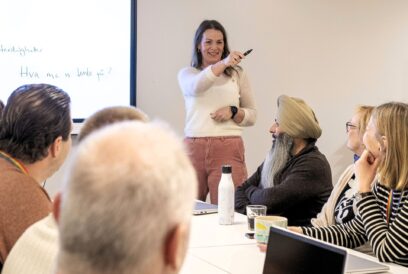

According to Christoph Bretgeld of SkillLab, the work and education experience of refugees and migrants often remain invisible to the labour market. Photo: SkillLab.
According to Christoph Bretgeld of SkillLab, the work and education experience of refugees and migrants often remain invisible to the labour market. Photo: SkillLab.
In his Speakers’ Corner column, Christoph Bretgeld argues that we must develop our perception of skills and acknowledge their roles as carriers of more accurate information. This would lead to better-functioning labour markets. Speakers’ Corner columns are produced in cooperation with the European Association for the Education of Adults.
When we talk about skills in the labour market, we must understand which skills people have, which skills they need for a desired occupation and what kind of guidance is needed to bridge possible gaps. Moreover, if we want to make the most of the skills that people have, we must be able to express and market them effectively, no matter how and where they have been acquired.
At SkillLab, where we develop career navigation platforms to help connect people with jobs and education, we have witnessed that in particular the work and education experience of refugees and migrants often remain invisible to the labour market. Too often they are not quizzed on the content of previous courses or jobs. It is often hard for refugees and migrants to create trust in their abilities.
To make the most of the skills, we must express and market them effectively, no matter where they have been acquired.
What leads to discrimination is often a strong reliance on signalling effects. Think of an educational institution or employer that everyone, or at least everyone in a given region, knows. Did you work for a big tech company? You must be smart then.
The underlying dysfunction works against a large part of population. Think of people who may have acquired valuable skills in informal experiences, people who have worked serving their families or communities. This is work that doesn’t translate into appealing titles on a CV.
ALL PEOPLE HAVE SKILLS, even if they don’t believe it themselves (we hear this a lot, unfortunately), and all people can acquire new skills. This means that all people have a pathway to employment. The way to better functioning labour markets is by forcing the shift to think of skills as a carrier of more accurate information.
Thousands of skills can be identified. As an example, the European Classification of Skills, Competencies and Occupations (ESCO) lists more than 13,000 competencies. Competencies entail skills and knowledge, among other aspects.
All people have skills, can acquire new skills, and therefore have a pathway to employment.
The challenge is how a person can choose which of the many thousand skills describes them best. Moreover, how can an employer name the skills they search for? Also, how do education providers articulate the skills they offer or understand which skills they should offer to bridge local or individual skills gaps?
THESE ARE THE QUESTIONS we address at SkillLab. We do this through technology, in particular with the help of artificial intelligence (AI). Since 2017 we have worked on the question of how to best build and leverage AI to get data from the people, instead of building assumptions about people.
We refer to this process as Skills-Profiling. It’s a central component in our digital career guidance platforms. Only if you have skills data which describes a person’s individual experiences in life, you can stop building on assumptions.
We work on how to best get data from people instead of building assumptions about people.
Skills-Profiling can be embedded in digital tools, it can be used in and across many languages and it eradicates bias. However, it requires a shift to think of skills as a carrier of more accurate information. It requires openness of all stakeholders to interact with each other, and to engage in the process of providing and receiving skills information.
This new way of interacting needs education providers to embrace it and to drive it forward. Education providers bridge skills gaps locally. The more accurately they close those gaps, the better for society.
Author







